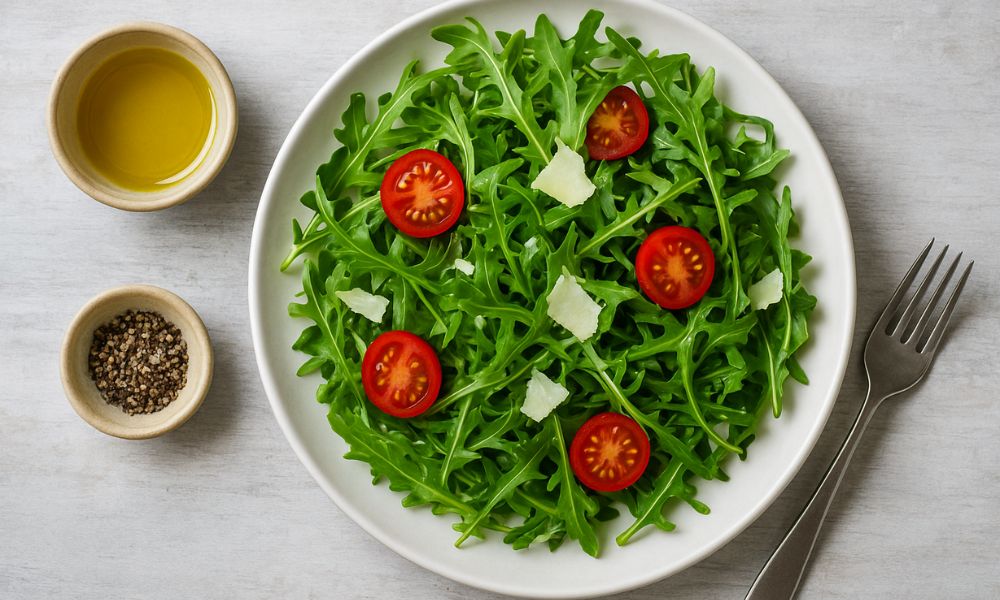Arugula, or rocket salad as it is often called, is a peppery but slightly bitter tasting green, and most people adore it in salads, sandwiches and other gourmet favourites. It has not only acquired popularity due to its taste, but also potential health values of the same. Nevertheless, similar to other foods, it may not fit all people.
Are rocket salads good or bad news? Does this kale cousin have health advantages? Can rocket salads be prepared in tasty and mouth-watering recipes? So which health-conscious consumers need to take note?
What Is Rocket Salad?
Rocket salad or arugula (Eruca sativa) is a flowering greens from the same family as broccoli, kale cabbage and much more. It has been consumed for centuries in the Mediterranean diet and is rich in essential vitamins and minerals as well as plant compounds.
Its pungent flavor is peppery sharp, making it the go-to ingredient for salads, pasta dishes and pizza topping and as a sprinkle for meats.
Nutritional Value of Rocket Salad
A 100-gram serving of raw rocket contains approximately:
- Calories: 25 kcal
- Protein: 2.6 g
- Carbohydrates: 3.6 g
- Fiber: 1.6 g
- Vitamin K: 109 mcg (136% of daily needs)
- Vitamin A: 47% of daily needs
- Vitamin C: 25% of daily needs
- Folate, calcium, and potassium – essential for bone and heart health
Health Benefits of Rocket Salad
Here’s a detailed breakdown of the health benefits of rocket salad so you can see exactly why it’s considered such a nutritious leafy green.
1. Packed with Nutrients but Low in Calories
Rocket salad is a nutrient-dense food — meaning it provides a high amount of vitamins and minerals with very few calories.
- Calories: Only ~25 kcal per 100g
- Macronutrients: Low in carbs and fat, moderate protein for a leafy green
- Micronutrients: Rich in vitamins A, C, K, folate, calcium, magnesium, and potassium
Benefit: You can eat a generous portion without worrying about calorie overload, making it ideal for weight management.
2. Rich in Vitamin K for Bone Strength
- Vitamin K plays a crucial role in bone mineralization and helps prevent fractures.
Rocket provides over 100% of the daily recommended vitamin K in just one serving. - Vitamin K also supports proper blood clotting.
Benefit: Helps maintain strong bones and reduces the risk of osteoporosis.
3. High in Antioxidants
Rocket is loaded with antioxidants like beta-carotene, lutein, and zeaxanthin.
- These compounds neutralize harmful free radicals in the body.
- They help slow down cell damage and aging processes.
Benefit: Supports skin health, strengthens immunity, and may reduce the risk of chronic diseases.
4. May Support Heart Health
Rocket contains dietary nitrates, which the body converts into nitric oxide.
- Nitric oxide helps dilate blood vessels, improving blood flow.
- This can help lower blood pressure and reduce strain on the heart.
Benefit: May lower the risk of hypertension and cardiovascular diseases.
5. Good for Eye Health
- Rocket’s vitamin A, lutein, and zeaxanthin are vital for vision.
These nutrients protect the eyes from UV damage. - May help prevent macular degeneration and cataracts.
Benefit: Keeps your eyesight sharp as you age.
6. Boosts Immunity
- Vitamin C in rocket helps strengthen the immune system by:
Supporting white blood cell production - Enhancing wound healing
- Acting as an antioxidant to fight infections
Benefit: Reduces the risk of colds, flu, and other infections.
7. Aids Digestion
- Rockets are a good source of dietary fiber.
- Fiber adds bulk to stool, making bowel movements regular.
- Helps maintain a healthy gut microbiome.
Benefit: Prevents constipation and supports long-term digestive health.
8. May Help in Cancer Prevention
As a cruciferous vegetable, rocket contains glucosinolates, plant compounds that have been linked to reduced cancer risk.
- These compounds may help the body detoxify potential carcinogens.
- Especially studied for their effects against stomach, lung, and colon cancers.
Benefit: Adds an extra layer of protection against certain cancers.
9. Supports Hydration
Rocket is about 90% water, which contributes to daily fluid intake.
Benefit: Helps keep you hydrated and supports skin elasticity.
Who Should Avoid Rocket Salad?
While rocket salad is safe for most people, some should exercise caution:
| Who Should Be Cautious | Why It May Be a Problem | Prevention Tips |
|---|---|---|
| People on Blood Thinners (e.g., Warfarin) | High vitamin K can interfere with medication effectiveness. | Eat rocket in consistent amounts and inform your doctor. |
| People with Thyroid Issues (Hypothyroidism) | Contains goitrogens that may affect thyroid hormone production if eaten raw in large amounts. | Lightly steam or cook rocket; ensure adequate iodine intake. |
| People with Digestive Sensitivities (IBS, Gas, Bloating) | Fiber and sulfur compounds can cause bloating or discomfort. | Start with small portions; pair with cooked vegetables; drink enough water. |
| People with Kidney Stones (Oxalate Sensitivity) | Contains oxalates that may contribute to stone formation. | Limit large portions; pair with calcium-rich foods to bind oxalates. |
| People with Cruciferous Vegetable Allergies | Rare allergic reactions like itching, swelling, or breathing issues. | Avoid rocket; seek medical help if symptoms occur. |
How to Consume Rocket Salad
Rocket (arugula) is versatile and can be eaten raw or cooked. Here are the best ways to enjoy it:
Fresh Salads
- Combine rocket with tomatoes, cucumber, olive oil, and lemon juice for a refreshing salad.
- Pair with cheese (like feta or parmesan) to balance its peppery taste.
As a Pizza Topping
- Add fresh rocket after baking for a sharp, fresh flavor.
In Pasta Dishes
- Toss into warm pasta just before serving to slightly wilt the leaves.
In Sandwiches & Wraps
- Use instead of lettuce for a stronger flavor and more nutrients.
In Smoothies
- Blend with fruits like pineapple or apple for a nutrient boost without overpowering bitterness.
Lightly Cooked
- Stir-fry or sauté for a milder flavor and reduced goitrogen content (good for those with thyroid issues).
Best Time to Eat Rocket Salad
Lunch: Great with the light lunch- perfect to prevent the post lunch slump.
Dinner: Serves as a good side salad or a topping to grilled fish, chicken or pasta.
Pre-Workout: Contains nitrates that are able to support enhanced blood circulation and stamina.
Do not Eat Your Lunch on an Empty Stomach in Case: You Have an Acidity Problem: The peppery flavour will only get the sensitive stomachs into a mild discomfort situation.
2 Simple Rocket Salad Recipes
1. Classic Rocket & Parmesan Salad
Ingredients:
- 3 cups fresh rocket
- 1 tbsp extra virgin olive oil
- 1 tbsp lemon juice
- Shaved parmesan cheese
- Salt and pepper to taste
Instructions:
- Place the rocket in a large bowl.
- Drizzle with olive oil and lemon juice.
- Add shaved parmesan, season, and toss gently.
2. Rocket, Beetroot & Walnut Salad
Ingredients:
2 cups fresh rocket
1 cooked beetroot, diced
¼ cup walnuts, toasted
1 tbsp balsamic vinegar
1 tbsp olive oil
Instructions:
- Combine rocket, beetroot, and walnuts in a salad bowl.
- Drizzle with balsamic vinegar and olive oil.
- Toss lightly and serve.
The Verdict: Is Rocket Salad Bad for You?
Rocket salad is a nutritional supplement that is healthy to most people in the population. It is a good combination of low-calorie peppery profile, allowing it to serve as the main ingredient in salads, wraps, and other side dishes due to their high nutrient density.
Yet people, who are taking the blood-thinning, have thyroid problems or tend to have digestive discomposures, should take it sparingly and cautions should be consulted when in doubt. To make it short, rocket salad should be seen as an ally rather than an enemy to your health provided that it is consumed in a moderate manner.
Read Our Latest Blogs: thetrendztoday



